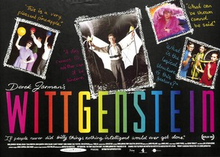| Wittgenstein | |
|---|---|
 UK theatrical release poster | |
| Directed by | Derek Jarman |
| Written by |
|
| Produced by | Tariq Ali |
| Starring |
|
| Cinematography | James Welland |
| Edited by | Budge Tremlett |
| Music by | Jan Latham-Koenig [1] |
Production companies |
|
| Distributed by |
|
Release dates |
|
Running time | 72 minutes [2] |
| Countries |
|
| Languages |
|
| Budget | £300,000 ($450,000) [1] |
| Box office | $40,029 [3] |
Wittgenstein is a 1993 experimental comedy-drama film co-written and directed by Derek Jarman, and produced by Tariq Ali. An international co-production of the United Kingdom and Japan, the film is loosely based on the life story, as well as the philosophical thinking of philosopher Ludwig Wittgenstein. The adult Wittgenstein is played by Karl Johnson.
Contents
The original screenplay by literary critic Terry Eagleton was heavily rewritten during pre-production and shooting by Jarman, radically altering the style and structure, although retaining much of Eagleton's dialogue. The story is not played out in a traditional setting, but rather against a black backdrop within which the actors and key props are placed, as if in a theatre setting.
The film was originally part of a series of 12 films on the life and ideas of philosophers, produced by Ali on behalf of Channel Four. Only four of the scripts got commissioned: Socrates by Howard Brenton, Spinoza by Ali, Locke by David Edgar and Wittgenstein by Eagleton. Spinoza was filmed and directed by Chris Spencer as Spinoza : The Apostle of Reason. Citizen Locke was filmed and directed by Agnieszka Piotrowska. These were broadcast in 1994 as 52-minute television films. [4]